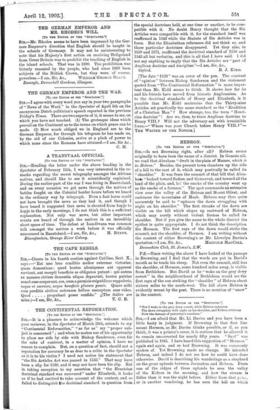HEBRON.
(To TEE EDITOR OP TER "SPECTATOR."] Sin,—Is not Browning right, after all? Hebron seems originally to have been the name of a district. In Genesis xiii. we read that Abraham " dwelt in the plain of Mamre, which is in Hebron." Besides, the present town clambers up the side of a hill to the east of it, which may poetically be called its " shoulder." It was from the summit of that hill that Abra- ham " looked toward Sodom and Gomorrah, and toward all the land of the plain, and, lo! the smoke of the country went up as the smoke of a furnace." The spot commands an extensive view over the valley of the Hebron and Mount Olivet, and embraces the mountains of Moab. Hebron may thus quite accurately be said to " upheave the dawn struggling with night on his shoulder." The first streaks of the dawn are visible on the hill which slopes up eastward of Hebron, which may surely without violent license be called its shoulder. But if you give the name to the whole district the epithet is quite appropriate. I do not think the description fits Hermon. The first rays of the dawn would strike the summit, not the shoulder, of Hermon. I am writing without the context of either Browning's or Mr. Llewelyn Davies's
quotation.—I am, Sir, &c., MAEcor..m MAcCom.. Devonshire Club, St. James's, S.W.
P.S.—Since writing the above I have looked at the passage in Browning, and I find that the words are put in David's mouth as he tends his sheep. Not even the summit, still less the shoulder, of Hermon, some hundred miles away, is visible from Bethlehem. But David as he " woke on the grey dewy covert" in the neighbourhood of Bethlehem would see the first rays of the sun striking the " shoulder " of Hebron about sixteen miles to the south-west. The hill above Hebron is evidently meant by the poet. There is no mention of " snow" in the context.










































 Previous page
Previous page